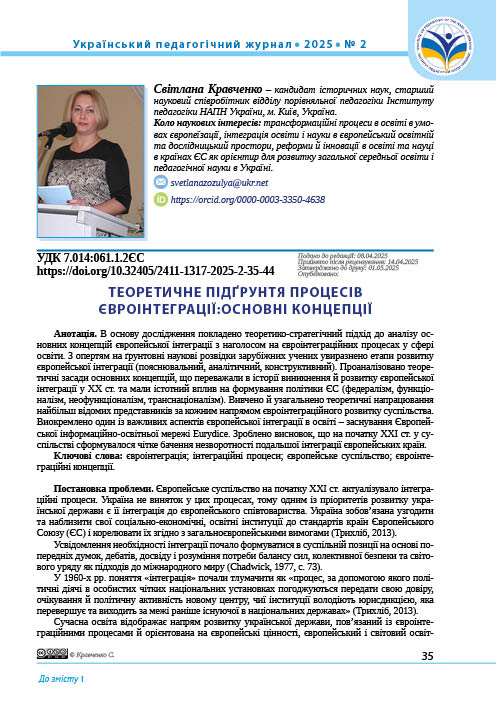Abstract
The research is based on a theoretical and strategic approach to the analysis of the main concepts of European integration with an emphasis on European integration processes in the field of education. Based on thorough scientific research by foreign scientists, the stages of development of European integration (explanatory, analytical, constructive) are highlighted. The theoretical foundations of the main concepts that prevailed in the history of the emergence and development of European integration in the 20th century and had a significant impact on the formation of EU policy are analyzed, and the theoretical developments of the most famous representatives in each of these areas are summarized: federalism – R.N. Coudenhove-Kalergi, functionalism – D. Mitrany, neofunctionalism – E.B. Haas, Ph. Schmitter, transnationalism (or the communication concept of European integration) – K.W. Deutsch. One of the important aspects of European integration in education is highlighted – the establishment of the European information and educational network Eurydice. It is concluded that at the beginning of the 21st century. a clear vision of the irreversibility of further integration of European countries was formed in society. Modern Ukraine deepens cooperation with the EU in the field of education and science, develops international partnerships, harmonizes educational regulatory legal acts and expands cooperation with EU countries, produces new opportunities in the context of the development of educational and scientific innovations, digitalization, professional development, and reform of general secondary education. Ukraine's European choice is determined by its geopolitical position and the common history of the formation and development of European culture. Now, in the conditions of the long-term military aggression of the Russian Federation against Ukraine, Ukrainians have become much more positive about European integration sentiments and are supporting them with practical actions. Therefore, at the current stage of educational development, integration is considered the most significant innovative educational direction of the 21st century. The prospect for further research in this direction is a more in-depth analysis of the theoretical aspects of adapting national education in Ukraine to European standards, understanding the priorities, principles, and directions of reforming national education in the context of its integration into the European and global educational space.
References
Вінникова, Н. А. (2023). Теорія та практики європейської інтеграції. Харків: ХНУ імені В. Н. Каразіна. https://ekhnuir.karazin.ua/server/api/core/bitstreams/798745f9-6afd-4e97-a7cd-7a726ba1ee9a/content
Єгоров, Г., Лавриченко, Н., & Мельниченко, Б. (2008). Тенденції реформування загальної середньої освіти у країнах Європейського Союзу (Н. Лавриченко, ред.). Київ: Інститут педагогіки НАПН України.
Кравченко, С. (2024). Інтеграція як сучасна тенденція розвитку освіти. У Компетентнісно орієнтоване навчання: виклики та перспективи (с. 130–133). https://lib.iitta.gov.ua/740903/
Кремень, В. (Ред.). (2016). Національна доповідь про стан і перспективи розвитку освіти в Україні. Київ: Педагогічна думка. https://mon.gov.ua/storage/app/media/nrk/Analitychni-materialy/7-natsionalna-dopovid-pro-stan-i-rozvitok-osviti-v-ukraini.pdf
Локшина, О. (2024). Європейський освітній простір як інтеграційна перспектива української освіти. Український педагогічний журнал, 2, 6–17. https://uej.undip.org.ua/index.php/journal/article/view/739/854
Миколюк, А. В. (2009). Концептуальний вимір теорії та підходів європейської інтеграції. Освіта регіону: політологія, психологія, комунікації, 2. https://social-science.uu.edu.ua/article/82
Національний підрозділ Евридіки в Україні. (2025). МОН України. https://eurydice.iea.gov.ua/home/eurydice-ukraine/
Трихліб, К. (2013). Європейська інтеграція – основа зближення правової системи України та Європейського Союзу. Актуальні проблеми держави і права, 69, 54–61. https://dspace.nlu.edu.ua/handle/123456789/13419
Хомутенко, Л. І., & Хомутенко, А. В. (2020). Теоретичне підґрунтя формування об’єднаної Європи. Економіка, управління та адміністрування, 4(90), 126–132. https://doi.org/10.26642/ema-2019-4(90)-126-132
Chadwick, F. A. (1977). Functionalism and integration. International Social Science Journal, 1(XXIX), 73–93. https://unesdoc.unesco.org/ark:/48223/pf0000023272
Haas, E. (1958). The Uniting of Europe. Stanford: Stanford University Press. https://www.scirp.org/reference/referencespapers?referenceid=1849434
History of the European Union. (б. д.). Encyclopedia of Humanities. https://humanidades.com/en/history-of-the-european-union/
Imber, M. F. (б. д.). David Mitrany. British scholar. Britannica. https://www.britannica.com/topic/functionalism-international-organizations
Nakano, M. (2013). European integration and changing British discourse on sovereignty. Thesis submitted to the University of Nottingham for the degree of Doctor of Philosophy, University of Nottingham. http://eprints.nottingham.ac.uk/13400/
European Union. (2007, 13 грудня). Treaty of Lisbon amending the Treaty on European Union and the Treaty establishing the European Community, signed at Lisbon. https://eur-lex.europa.eu/legal-content/EN/TXT/?uri=celex:12007L/TXT
Wiener, A., Borsel, T.A., & Risse, T. (2004). European Integration Theory. Oxford: Oxford University Press. https://books.google.com.ua/books/about/European_Integration_ Theory.html?id=F2R7DwAAQBAJ&redir_esc=y
Chadwick, F. A. (1977). Functionalism and integration. International Social Science Journal, 1(XXIX), 73–93. https://unesdoc.unesco.org/ark:/48223/pf0000023272 (in English).
Haas, E. (1958). The Uniting of Europe. Stanford: Stanford University Press. https://www.scirp.org/reference/referencespapers?referenceid=1849434 (in English).
History of the European Union. (n.d.). Encyclopedia of Humanities. https://humanidades.com/en/history-of-the-european-union/ (in English).
Imber, M. F. (n.d.). David Mitrany. British scholar. Britannica. https://www.britannica.com/topic/functionalism-international-organizations (in English).
Khomutenko, L. I., & Khomutenko, A. V. (2020). Teoretychne pidgruntia formuvannia obiednanoi Yevropy. Ekonomika, upravlinnia ta administruvannia, 4(90), 126–132. https://doi.org/10.26642/ema-2019-4(90)-126-132 (in Ukrainian).
Kravchenko, S. (2024). Intehratsiia yak suchasna tendentsiia rozvytku osvity. In Kompetentnisno oriientovane navchannia: vyklyky ta perspektyvy (pp. 130–133). https://lib.iitta.gov.ua/740903/
Kremen, V. (red.). (2016). Natsionalna dopovid pro stan i perspektyvy rozvytku osvity v Ukraini. Kyiv: Pedahohichna dumka. https://mon.gov.ua/storage/app/media/nrk/Analitychni-materialy/7-natsionalna-dopovid-pro-stan-i-rozvitok-osviti-v-ukraini.pdf (in Ukrainian).
Lokshyna, O. (2024). Yevropeiskyi osvitnii prostir yak intehratsiina perspektyva ukrainskoi osvity. Ukrainskyi pedahohichnyi zhurnal, 2, 6–17. https://uej.undip.org.ua/index.php/journal/article/view/739/854 (in Ukrainian).
Mykoliuk, A. V. (2009). Kontseptualnyi vymir teorii ta pidkhodiv yevropeiskoi intehratsii. Osvita rehionu: politolohiia, psykholohiia, komunikatsii, 2. https://social-science.uu.edu.ua/article/82 (in Ukrainian).
Nakano, M. (2013). European integration and changing British discourse on sovereignty. Thesis submitted to the University of Nottingham for the degree of Doctor of Philosophy, University of Nottingham. http://eprints.nottingham.ac.uk/13400/ (in English).
Natsionalnyi pidrozdil Evrydiky v Ukraini. (2025). MON Ukrainy. https://eurydice.iea.gov.ua/home/eurydice-ukraine/ (in Ukrainian).
European Union. (2007, December 13). Treaty of Lisbon amending the Treaty on European Union and the Treaty establishing the European Community, signed at Lisbon. https://eur-lex.europa.eu/legal-content/EN/TXT/?uri=celex:12007L/TXT (in English).
Trykhlib, K. (2013). Yevropeiska intehratsiia – osnova zblyzhennia pravovoi systemy Ukrainy ta Yevropeiskoho Soiuzu. Aktualni problemy derzhavy i prava, 69, 54–61. https://dspace.nlu.edu.ua/handle/123456789/13419 (in Ukrainian).
Vinnykova, N. A. (2023). Teoriia ta praktyky yevropeiskoi intehratsii. Kharkiv: KhNU imeni V. N. Karazina. https://ekhnuir.karazin.ua/server/api/core/bitstreams/798745f9-6afd-4e97-a7cd-7a726ba1ee9a/content (in Ukrainian).
Wiener, A., Borsel, T.A., & Risse, T. (2004). European Integration Theory. Oxford: Oxford University Press. https://books.google.com.ua/books/about/European_Integration_ Theory.html?id=F2R7DwAAQBAJ&redir_esc=y (in English).
Yehorov, H., Lavrychenko, N., & Melnychenko, B. (2008). Tendentsii reformuvannia zahalnoi serednoi osvity u krainakh Yevropeiskoho Soiuzu (N. Lavrychenko, ed.). Kyiv: Instytut pedahohiky NAPN Ukrainy. (in Ukrainian).

This work is licensed under a Creative Commons Attribution-NonCommercial-ShareAlike 4.0 International License.


